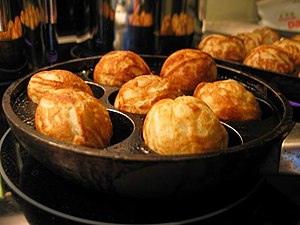David Heiller
We took a trip to Brownsville to see my mother last weekend. It wasn’t
the best weekend to go, what with the Askov Fair and the Festival of the Little
People both going on.
I don’t think the two
events conflicted with each other. There aren’t many little people at the Askov
Fair, at least not after they stop at the æbleskiver stand.
 |
| Æbleskiver, YUM! |
George Clegg used to
be one of the first customers at the æbleskiver stand. He said that eating æbleskiver at the Askov
Fair was like eating a hotdog at a ballpark. It just tasted better there.
George is back to stay
in Askov now. His relatives scattered his ashes on the old family farm three
miles northwest of Askov during the fair.
Rutabaga Days went
fine without me. I felt guilty about missing it. As soon as I would start feeling
better, Jay Eull would ask me if I was going to the fair, so I would feel
guilty again. He asked me at least twice a day.
Jay’s a good guy, really.
But life is such that
carving out a weekend to see Mom isn’t as easy as it should be. There’s only so
much room in the old house, and with seven children, Mom has to use diplomacy
in setting a schedule for the old bedrooms.
The problem actually
is more on our end. Summer is a busy time. Kids call it summer vacation, but
with softball and baseball and swimming and camp and painting the house, to name
a few things, it doesn’t seem like a vacation.
 |
| David leaping from the GREAT dunes in Brownsville. |
When a weekend emerges that is free to see Mom, it’s like a mirage in the desert that turns out to be real.
Brownsville is
changing and growing. The old 1873 school has been torn down and replaced with
a community center. I still get sick when I think of it.
The beach where we used to go swimming and
fishing has been replaced with fancy houses that sit so close together you’d
better not snore when you sleep. Just a lot costs $60,000.
But home is still an oasis. It comes complete
with sand dunes. The Army Corps of Engineers was dredging the main channel of
the Mississippi while we were there.
They sucked the sand off the bottom of the river
and piped it onto a beach that developers haven’t grabbed yet. The more the
dredge pumps, the higher the beach grows.
Bulldozers work around the clock, pushing the
sand around. By the time the water re-enters the river, it is clean and there
is a mountain in its wake.
Playing in this water and sand is great fun. We
used to do it as children. We would stand close to the gushing black water,
stepping gingerly, daring each other to step into the deep pool that was gouged
into the sand.
 |
| Noah in the water and dunes at Brownsville. |
I’m happy to report that it is just as fun to do this as an adult. I was scared to see my 14-year-old son take the same chances I used to take, but I held my tongue. The element of fear and danger is part of what makes it attractive.
To see your own children enjoy something like
you did is a thrill in its own right.
The sand still squeaked under foot. The water
still rippled around our legs. The holes where we sank in to our knees still
made our heart pound with panic.
Home hadn’t changed
so much after all. The shifting sands are a constant part of Brownsville.
 |
| Sitting with Grandma on the porch. |
So is music on the porch. I have sat there with my banjo for 20 years, playing for myself, for Grandma, for Mom, for the neighbor kids, for nephews and nieces and cousins and our children, and mostly for myself.
It’s one of those spots that just feels right
for playing music. So I sat there again last weekend and played my banjo and
button box. The button box is louder than a banjo, if you can believe it. The
sound carries up the hill so more people can lie awake at night wondering what
the heck that noise is.
Mom even remarked on my music. I know she likes
my music. She doesn’t have to say so, so she doesn’t. But she came out and
said, “Just think of all the years you’ve played music there, David.”
That made me feel good. Banjos and accordions
aren’t always so well received.
Trips back home can
work miracles like that. They are worth it, even if you miss a fair or two.






